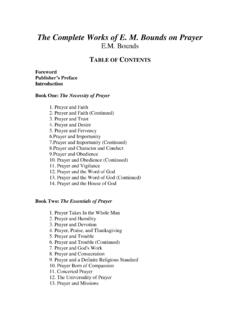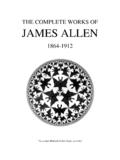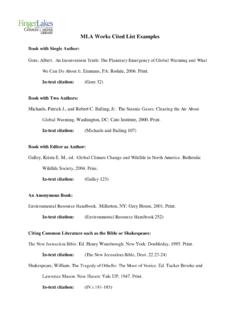Transcription of Freud - Complete Works
1 Freud - Complete Works 2975 REPRESSION (1915) Freud - Complete Works 2977 REPRESSION One of the vicissitudes an instinctual impulse may undergo is to meet with resistances which seek to make it inoperative. Under certain conditions, which we shall presently investigate more closely, the impulse then passes into the state of repression [ Verdr ngung ]. If what was in question was the operation of an external stimulus, the appropriate method to adopt would obviously be flight; with an instinct, flight is of no avail, for the ego cannot escape from itself.
2 At some later period, rejection based on judgement (condemnation) will be found to be a good method to adopt against an instinctual impulse. Repression is a preliminary stage of condemnation, something between flight and condemnation; it is a concept which could not have been formulated before the time of psycho-analytic studies. It is not easy in theory to deduce the possibility of such a thing as repression. Why should an instinctual impulse undergo a vicissitude like this? A necessary condition of its happening must clearly be that the instinct s attainment of its aim should produce unpleasure instead of pleasure.
3 But we cannot well imagine such a contingency. There are no such instincts: satisfaction of an instinct is always pleasurable. We should have to assume certain peculiar circumstances, some sort of process by which the pleasure of satisfaction is changed into unpleasure. In order the better to delimit repression, let us discuss some other instinctual situations. It may happen that an external stimulus becomes internalized - for example, by eating into and destroying some bodily organ - so that a new source of constant excitation and increase of tension arises.
4 The stimulus thereby acquires a far-reaching similarity to an instinct. We know that a case of this sort is experienced by us as pain. The aim of this pseudo-instinct, however, is simply the cessation of the change in the organ and of the unpleasure accompanying it. There is no other direct pleasure to be attained by cessation of pain. Further, pain is imperative; the only things to which it can yield are removal by some toxic agent or the influence of mental distraction. The case of pain is too obscure to give any help in our purpose.
5 Let us take the case in which an instinctual stimulus such as hunger remains unsatisfied. It then becomes imperative and can be allayed by nothing but the action that satisfies it; it keeps up a constant tension of need. Nothing in the nature of a repression seems in this case to come remotely into question. Freud - Complete Works 2978 Thus repression certainly does not arise in cases where the tension produced by lack of satisfaction of an instinctual impulse is raised to an unbearable degree. The methods of defence which are open to the organism against that situation must be discussed in another connection.
6 Let us rather confine ourselves to clinical experience, as we meet with it in psycho-analytic practice. We then learn that the satisfaction of an instinct which is under repression would be quite possible, and further, that in every instance such a satisfaction would be pleasurable in itself; but it would be irreconcilable with other claims and intentions. It would, therefore, cause pleasure in one place and unpleasure in another. It has consequently become a condition for repression that the motive force of unpleasure shall have acquired more strength than the pleasure obtained from satisfaction.
7 Psycho-analytic observation of the transference neuroses, moreover, leads us to conclude that repression is not a defensive mechanism which is present from the very beginning, and that it cannot arise until a sharp cleavage has occurred between conscious and unconscious mental activity - that the essence of repression lies simply in turning something away, and keeping it at a distance, from the conscious. This view of repression would be made more Complete by assuming that, before the mental organization reaches this stage, the task of fending off instinctual impulses is dealt with by the other vicissitudes which instincts may undergo - reversal into the opposite or turning round upon the subject s own self.
8 Freud - Complete Works 2979 It seems to us now that, in view of the very great extent to which repression and what is unconscious are correlated, we must defer probing more deeply into the nature of repression until we have learnt more about the structure of the succession of psychical agencies and about the differentiation between what is unconscious and conscious. Till then, all we can do is to put together in a purely descriptive fashion a few characteristics of repression that have been observed clinically, even though we run the risk of having to repeat unchanged much that has been said elsewhere.
9 We have reason to assume that there is a primal repression, a first phase of repression, which consists in the psychical (ideational) representative of the instinct being denied entrance into the conscious. With this fixation is established; the representative in question persists unaltered from then onwards and the instinct remains attached to it. This is due to the properties of unconscious processes of which we shall speak later. The second stage of repression, repression proper, affects mental derivatives of the repressed representative, or such trains of thought as, originating elsewhere, have come into associative connection with it.
10 On account of this association, these ideas experience the same fate as what was primally repressed. Repression proper, therefore, is actually an after-pressure [Nachdr ngen]. Moreover, it is a mistake to emphasize only the repulsion which operates from the direction of the conscious upon what is to be repressed; quite as important is the attraction exercised by what was primally repressed upon everything with which it can establish a connection. Probably the trend towards repression would fail in its purpose if these two forces did not co-operate, if there were not something previously repressed ready to receive what is repelled by the conscious.











![The Book of the Damned, by Charles Fort, [1919], at sacred ...](/cache/preview/c/1/4/e/b/3/b/4/thumb-c14eb3b4b6cefb47ee1be55bf987c12f.jpg)